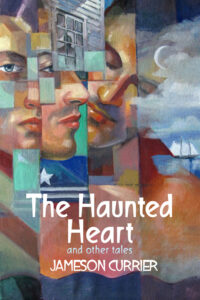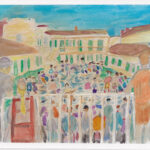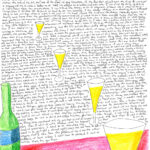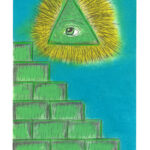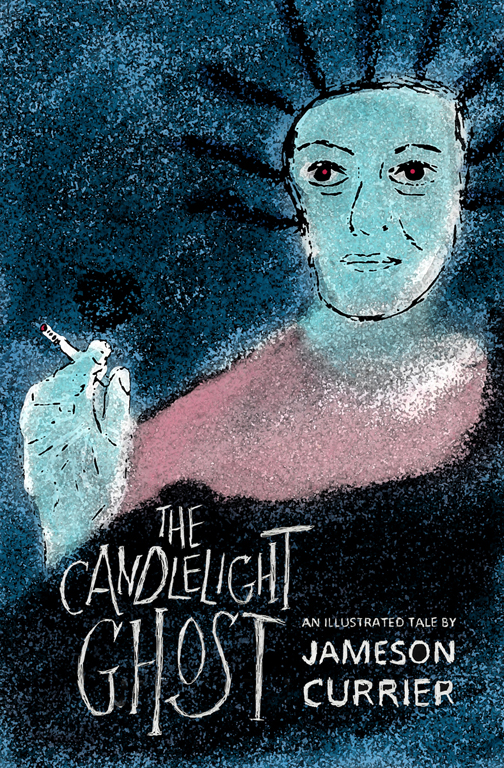by Jameson Currier
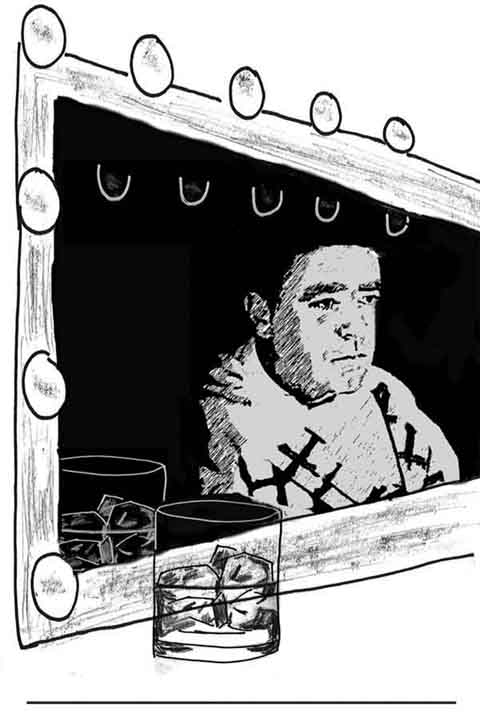
art by Jameson Currier
Adrian Chase walked into his dressing room and stood in front of the air conditioner. It was over ninety degrees on the lot and not even noon. He was sixty-nine years old and out of breath from the walk from the soundstage and the three short stairs up to the door of his trailer. He sat in the chair in front of the makeup mirror and was surprised to see a clear tumbler filled with ice and an amber liquor. He did not remember pouring himself a drink and certainly would have thought twice about starting a cocktail so early in the day. He usually waited till four o’clock before reaching for a drink, unless he was particularly rattled.
He was particularly rattled. The baby-faced assistant director had brought him new pages for the pilot moments after they had finished the first table reading the day before. But he had been pleased by that, not rattled. He had gone from a mute grandfather who sat in front of his television ignoring his family to a crotchety character with a line and, he hoped, a laugh from the audience. That certainly wouldn’t have provoked pouring himself a drink so early in the morning. No, he had even taken it in stride when the AD had flagged him down as soon as he had arrived on the soundstage and handed him another set of new pages. On his way to his trailer he had stopped and chatted with Lissa, the stage manager, before flipping through the new script and seeing his line.
Yes, that could do it. The newer pages. That could have caused him to pour himself a glass of whiskey. But he couldn’t have done that himself because he had just stepped inside the trailer. Some kind soul must have done it for him, knowing what his reaction would be. Now, he deliberated on whether to drink it or toss it out. Years and years of analysis had taught him what he already knew: he was a nasty drunk. This, this glass of whiskey, would be sure to set him on that path the moment the fire hit his belly. No, he needed to remain calm and focused. This was a job. Just as he reached for the glass to toss it down the sink, he noticed a man standing behind him, reflected in the mirror. Startled, Adrian spilt some of the drink on the counter as he tried to put the glass back down.
The man in the mirror was himself. He was smiling and Adrian was not.
“Go ahead, have it,” the man in the mirror said with a wicked, leering grin. “You deserve it. After all you’ve put up with.”
Adrian, anxious and intimidated by his own image, lifted the glass as steadily as he could and then stopped. What the hell was going on here? He turned around and looked out at the room and no one was there. He looked in the mirror again and there he was. The same fellow. Himself, standing over his shoulder, wearing the same outfit he was wearing now, dark slacks and a white shirt. Adrian didn’t think he was hallucinating. He certainly wasn’t overworked, not with this job. He hadn’t worked in close to a month. And he wasn’t sick—or at least he certainly didn’t think he was ill, only momentarily winded from the heat and old age. Last week he had been to see a doctor because of the episode of vertigo he had experienced after taking an antihistamine. The doctor had said there was nothing wrong with him; his hearing and vision had all tested fine and the doctor suggested he might be stressed and overworked. Stressed and overworked? Of course he wasn’t stressed and overworked. He had flown to the West Coast so he could be stressed and overworked, stressed over a fabulous part and worked to death, but nothing had come his way. Bored and depressed was more like it. First, the movie he had been cast in was canceled when the star dropped out to take another project, and then the advertising agency decided the national commercial Adrian had been cast for was the wrong approach for the client. Now, he was testing for a role in a sitcom. A pilot. Not even a sure thing. Adrian was certain this lousy script would never make it to prime time. It was a waste of his time. If anything was going on then it was most certainly not because he was overworked. No, he was a professional who had showed up to do his job, no matter how lousy the finished product was to be in the end.
Adrian studied the man standing over his shoulder. He looked exactly as Adrian looked now—graying hair turning white, bags beneath the eyes, fleshy jowls framing his cheeks, and pale, colorless eyes. “If you’ve come to scare me,” Adrian said. “You could at least be younger. I was a rather dashing fellow once upon a time.”
He had been a handsome boy on the stage. Perfect posture, perfect teeth, thick curly hair. A signature baritone voice that belied breeding and class. And his career as a lover was as notable as his acting résumé. The man standing behind him was the lecherous kind of fool Adrian had spent years avoiding in dressing rooms, an old troll who lusted after nothing else but youth.
In the mirror, Adrian watched the figure pick up the glass and offer it to him first.
“Go ahead,” Adrian said to his image. “Drink yourself miserable. I don’t need a crutch. I can do this crappy role in my sleep.”
Adrian cast his eyes away from the mirror and down to the script. He found his line, read it, and tried to imagine himself saying the words. Then, he said the words out loud to the man in the mirror: “Gotta run and blow some gas!”
“Pretty lousy, if you ask me,” the man in the mirror said. “Fifty years’ worth of top-notch acting experience and you’re reduced to doing lines about flatulence.”
Adrian tried to ignore the comment, which was like ignoring his conscience, only more tangible, like someone was standing over his shoulder and admonishing him, which was exactly what was happening. Or was it? Maybe he was just talking to himself. He looked up from his script and there he still was, standing over himself with his arms crossed and resting on his paunch. The glass of whiskey was still on the counter.
“Not your proudest moment, eh?” the man in the mirror said.
“I’ve no regrets,” Adrian answered himself. “I’ve had a terrific career.”
“Career?” His image smiled back at him. “What about the rest of your life?”
“What ‘rest’ are you referring to?” Adrian answered. “My career is my life.”
“Precisely,” his image replied. “It’s all made up. Nothing real to it, is there?”
* * *
“I’ll junk up the sweatshirt a little,” Candy said. “Put a soda stain on it at the chest. Maybe ketchup at the hem.”
Candy was the assistant wardrobe consultant. Adrian had never met the wardrobe consultant or costume designer for the pilot, if there was a costume designer. He was standing in front of a mirror in a curtained-off area of the wardrobe department wearing the oversized sweatshirt and pants that his grandfatherly character would wear. Candy’s interpretation was that the grandfather would be a slob.
“Perhaps Grandpa is a neatnik,” Adrian said.
“Neatnik?”
“Conscientious.”
“The guy stinks up the house!” Candy said and laughed.
Adrian wasn’t sure if the laugh was directed at him or his character. “Un-knowing-ly,” Adrian enunciated slowly.
“That’s why it’s so funny,” Candy said. “In his mind he’s a neatnik but in reality he’s an old man who spills things. Maybe I’ll add a mustard stain too.”
“Mustard?”
“I hope it won’t make you hungry!” Candy said and laughed again.
It was a harmless sort of laugh which Adrian did not appreciate because he found it irritating. He found everything about the woman irritating. Her silly oversized jewelry. Her smelly perfume. Her name. Candy. Candy should be a hooker’s name, not that of an assistant wardrobe consultant.
“Take them off and leave them on the hook and I’ll dirty them up before the taping,” she said and left the curtained area.
Adrian was alone in front of the mirror. His throat was dry and a wave of nausea made him dizzy. Mustard! He was about to take off the sweatshirt when he saw an image of a young man reflected in the mirror and standing behind him. He was dressed in a dark suit with a thin tie. His curly hair was longish and wild, like the rock stars of the early sixties. The Beatle bob.
“I’ll be right out,” Adrian said to the fellow.
“Don’t hurry on my account,” the young man said.
The young man didn’t leave. He folded his arms across his chest. One hand held a drink: a tumbler of ice with an amber liquor. He rattled the glass so the ice gave out a light tinkly sound. Adrian knew immediately who it was. He didn’t have to turn around and find that he was still there. Or not. It was a vision of himself at twenty-five. “Nice and neat,” Adrian nodded to his younger self in the mirror.
“Sharp,” his younger image replied and held the tumbler out as a toast. “Don’t you think?”
He’d landed on the London stage as a brash young man from Dorset. He was fearless, no role was unapproachable, nor out of his grasp. He played the game and played it well. He allowed himself to be fondled and always provided an extra “service” when an audition required one. His future was promising. He had played Hamlet by the time he was twenty-one. Twenty-one. And garnered laudable reviews for it. His career skyrocketed. He was willing to tackle any role. Including Eddie Lord, the nasty young lover in a new play bound for the West End. A nasty young lover—to another man. A role he could do in his sleep because it mirrored his own life so closely. His life with Jon. Jon, the stocky working class stiff from Glasgow who wanted to be an actor, too, with a barrel chest full of dark hair and a bag of accents he could change on cue. They had met at the Academy. Jon was rugged and handsome, like he had spent seasons roaming the moors. He was serious and committed to everything. He unleashed something in Adrian that otherwise might have taken years for him to accept as more than something he only did to get ahead. They moved in together while still studying and doing workshops. It was a good arrangement. Two bachelors sharing a flat. No one suspected. Even when fame arrived it was never a topic of conversation in the press. Until he became Eddie Lord.
Adrian’s performance as Eddie Lord was so credible it started critics’ tongues wagging about his private life. Did he or didn’t he like guys? Jon thought they both should be out and open about their relationship, public about everything, including their other lovers, tricks, and affairs. Adrian balked and resisted. His opposition created arguments and nasty scenes. He moved out of the flat and got a bigger place in Soho by himself. Jon protested. It made what was invisible now highly suspect when one of them stayed over too late with the other. It didn’t help that Adrian had also filmed a small part in an American film that made a big impact. Another nasty young man. A nasty young homosexual. It was one of his smallest roles, but his most bitter performance on record. And then Jon was arrested in a public toilet. He had no choice but to stop seeing Jon and start being seen with Izzie. And it helped that he liked Izzie. Elizabeth Rippen, the American heiress and would-be actress. Izzie was outrageous. She liked drinking and partying and creating a scene in public. With Jon out of the picture and Izzie as a decoy Adrian could be as hedonistic as he wanted because everyone wrote about her. Or him and her. He asked Izzie to marry him. To squelch what rumors remained about his homosexuality. Even though his colleagues, his peers in the theater and in film, those other gay actors in London and New York and Hollywood, knew all about him and the guys he slept with—many of these same fellows, in fact, he had slept with himself.
They were engaged until she met another man she liked better. A man who would sleep with her. And their spats became more public, more visible. The media adored the sparring couple so much that they had to remain apart.
“You couldn’t escape it, could you?” the man in the mirror said. “It was always a part of your résumé.”
“I wasn’t Eddie Lord.”
“But you were. You broke Jon’s heart.”
“We were young. What did we know?”
“He knew he loved you.”
“I found him a decent barrister,” Adrian said. “I kept it out of court.”
“For which he was grateful,” his image replied. “And after which he expected you would return.”
“We couldn’t go back to the way things were,” Adrian said. “He knew that.”
“He was willing to risk what you wouldn’t,” the man in the mirror said.
“I got him that part, didn’t I?” Adrian said. “The part he begged me to help him get.”
“But he died before he could do it. Suicide.”
“It was an accident.”
“An accidental overdose.”
“Why bring this up after all these years?”
“Why haven’t you forgotten it, if you don’t feel some form of guilt?”
“Guilt?” Adrian replied. “It was different then. It was a different time.”
“Always a bit ashamed, aren’t we?”
“He knew how I felt about him.”
“Which was why you know it was no accident.”
* * *
He wasn’t ready to return to his dressing room and face another image of himself. Instead, he spotted Glenn, the production stylist, at the crew table, mulling over the spread of bagels and doughnuts. Glenn was an openly gay guy, a fellow with a shaved scalp, tattoos, piercings, and big arms.
“Go ahead,” Adrian said to him. “I doubt if a few carbs would do you any harm.”
“Why can’t they do something healthier?” Glenn moaned. “How about crudités and low-fat dip for a change?”
“I doubt that would attract anyone to the table,” Adrian answered and reached for a pastry. He followed Glenn to a row of chairs against the soundstage wall and balanced a paper cup of hot coffee and the pastry on his lap. They made chitchat about the weather (“It should break on the weekend.”) and the lot. (“Everyone’s buzzing about the reality show being taped next door.”) Adrian eyed the beefy fellow—he must be in his early thirties—from his peripheral vision—the way Glenn’s bicep flexed as he ate the bagel he had smeared with cream cheese, the size of his lips and the width of his jaw, the stubble of hair on his scalp. Youth, he thought, wasted on the youth. He wanted to strip the fellow, ask him to prance around nude so he could admire his physique, then suggest they get down to the real business at hand. Sex. Ah, if only his heart could stand such delicious torture.
Instead, Adrian asked if the pilot taping was still on schedule for the afternoon.
“Yep,” Glenn said between mouthfuls. “When you flying out? Tonight? Tomorrow?”
“No, no,” Adrian said. “I’m here for a while.”
“Where you crashing?” Glenn asked.
“A friend’s place in the Hills.”
“Cool.”
There was a lull in the conversation, as they both finished their food. Glenn shifted in his chair as if to leave, then stopped and said to Adrian, “Do you mind if I ask you a personal question?”
“Of course not. My personal life is rather public these days.”
“My lover would kill me if I let the chance pass.”
“Hmmm… Well then, go ahead.”
“Was it true about Sir Harry?”
“Harry?”
“The myth?”
“Ah, the endowment?”
Glenn nodded and widened his eyes. Sometimes Adrian resented these questions, the perverse curiosity of the voyeur of fame, but he liked this young fellow and didn’t mind sharing and perpetuating The Myth of Harrold Harcourt.
“Whatever you’ve heard,” Adrian said. “It was all true.”
Yes, it was true. Sir Harrold Harcourt was a perpetual cad. A rogue. A louse. He could drink Adrian under the table and out whore him on every level. But he was the great love of Adrian’s life. They were together for sixteen years—not all of them brilliant and not all of them lousy, but every one of them full of drama. Best friends, to the public. Partners to the industry crowd. Lovers in the eyes of the community. The dinner parties that they gave in Kensington and Bel Air were notorious. Guests always brought guests. The police always seemed to hear of them.
“How could you ever let him out of your sight?” Glenn asked.
“Dear boy, I had it so many times it wasn’t new anymore. And the novelty wore off early on. Harry’s cock was such an inelegant thing. You couldn’t quite get your lips around it, and it took forever for it to get hard.”
The salacious detail delighted the young man. “Be still my heart,” he said and smiled, then feigned swooning by lifting his fist to his forehead in a showy fashion.
The gesture provoked a loud laugh from Adrian. “But when it was hard,” he added. “Harry certainly knew what to do with it.”
* * *
Adrian watched the rehearsal until it was time for his scene. On the set, he sat in the old armchair, pretending to watch a television. He delivered his line effortlessly. When the director called it a wrap, Lissa mentioned that sound effects would be added for the taping.
“Sound effects?” Adrian asked.
“The gas,” Lissa said and laughed. Adrian disliked her laugh as much as he did Candy’s, though this one had a little too much intelligence behind it, as if Lissa were laughing down at him.
Adrian walked back to his trailer dejected, his stomach grumbly from the pastry and the acidity of the coffee. His agent had been able to negotiate two things properly for this fiasco—a private dressing room and featured billing. Adrian stepped inside the trailer and saw the glass of whiskey on his counter. He had forgotten all about the man in the mirror.
“Go ahead,” a voice said. “Have it.”
The man in the mirror was younger than the one he had seen in his trailer before, but considerably older than the youth he had been with in the costume room. He was The Widower. The Man Who Was Left Behind.
“It was Harry’s choice not to tell anyone he was sick,” Adrian said. “I was only honoring what he wanted.”
“So you concocted an elaborate rouse,” the man said. “A liver disease. How convenient. In front of the world with your lover dying of AIDS, you went before the cameras and said it was a liver problem and you were stepping in to save the day. No one trusted you after that. Not even your own community.”
Harry’s star turn as a gadabout in a BBC miniseries had brought him a lot of notoriety. And the rumors started. Especially when he decided not to act anymore. He didn’t like the way he was aging, wasting away daily before his eyes because of a virus in his blood. His retirement was a way to gracefully step aside and get better. Only he didn’t. Didn’t get better.
“We were great friends,” Adrian said. He felt a weakness in his chest and voice.
“That’s what you told the press,” the man in the mirror said. “He was furious with you. Taking his part before he was cold in the grave.”
Adrian lucked out when Harry turned down a role and it was offered to him instead. Adrian took the part and it was end of things between them. When Adrian left to film the movie, Harrold died.
“He turned it down.”
“And you stepped over him to take it. With him on his deathbed.”
“But I made up for it, didn’t I? After he died,” Adrian said to the man in the mirror. “I did all that campaigning against Clause 28. It was a big change for me.”
“Ah, yes,” the man in the mirror said. “It was suddenly very fashionable to be gay and angry. It served you well.” The man nodded at the glass. “Take a sip. You deserve it.”
“Think I will,” Adrian said. “Think I will.”
He laughed or thought he laughed. He looked up at the mirror but the man was gone. Adrian turned around, but there was no one else in the room. No one in the mirror. And no drink waiting for him.
He felt suddenly tired. The heartburn from the pastry and the coffee was overwhelming. He went to the chair by the air conditioner and stretched out his feet and fell asleep.
He was woken a few hours later by a knock at the door. It was Candy dropping off his clothes for the taping. On the sweatshirt were a yellow stain and a red stain. She laughed when she handed them to him. That obnoxious, irritating giggle.
Adrian dressed in the sweatshirt and pants. In front of the mirror, he waited for his image to appear. He was glad when he realized he was finally alone.
A few minutes later, however, Glenn arrived with a makeup kit and Adrian sat in front of the mirror while the younger man added more years to his face.
“Gay men always have younger complexions,” Glenn said. “Don’t you think?”
The comment rattled Adrian, but he held his displeasure in the tightness of his cheeks. He didn’t like being marginalized into a category. The gay category. Even after all these years, after all that had happened. He never denied that he was a homosexual when asked. That was the concession he had made in his life. But he was an actor first. Not a gay actor.
Adrian distracted himself from the rising bad mood by focusing again on the movement of Glenn’s bicep as he brushed powder across his face. What would I do if I could have another chance? he thought. Another man. Another lover. I would dote on him and make him happy.
“My lover and I are having some friends over on Saturday,” Glenn said. “We’d love it if you would come.”
“Hmmmm… Saturday?” Adrian lifted his eyes and found Glenn’s.
“We know you’re busy, but it would be a lot of fun.”
“Sounds lovely,” Adrian answered. “I would love it.”
Glenn wrote down his address on the front page of Adrian’s script. Adrian nodded and smiled. An invitation. An invitation to something fun.
When Glenn left, Adrian stood and stretched through some yoga poses, trying to relieve the lingering indigestion that haunted him. He felt optimistic and desirable because of Glenn’s invitation, though still pessimistic about the upcoming taping and his ridiculous line. He felt the warring moods in his mind, which was when the man in the mirror returned.
“Nothing will come of it,” the man in the mirror said to Adrian. He was again the old fellow he had seen that morning. The old fellow who had arrived on set to tape a lousy television pilot. And the glass of whiskey was back on the counter.
“Why can’t you be happy for once in your life?” Adrian asked his image.
“Oh, I’ve had pleasure,” the man said. “Plenty of that.”
“No, happy.”
“Happy?”
“Happy.”
“To happiness, then…” the man said. He lifted the glass of whiskey off the counter and took a sip. Adrian felt the fire burn in his stomach. The man in the mirror smiled and took another sip, rattled the ice in the glass and drank some more. As he swallowed, an ice cube stuck in the man’s throat. Adrian saw the man’s expression change in the mirror. That horror of disbelief that something like this could happen. In his own chest, Adrian felt a burning fire and clutched at it dramatically.
He fell to the floor and felt a tremor of terror. He let go of a large bubble of gas that had been trapped inside him all day. It rumbled and burst through him with an awful sound and a dreadful stench. This had all been a mistake, he thought, clutching his chest and gasping for air. An awful mistake. This was not how he had imagined his life would end. This was no way to end a brilliant career.
__________
“The Man in the Mirror” first appeared in Icarus, a magazine of gay speculative fiction, and is included in the author’s collection, The Haunted Heart and Other Tales (Chelsea Station Editions, 2012).
Copyright Jameson Currier. Reprinted by permission of author and publisher.
